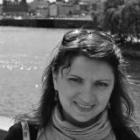“The war has become a serious challenge for religious actors in Ukraine”
Viktor Yelensky, professor of religion, in a conversation with Yuliya Yurchuk on the position of religions in Ukraine, and different religious actors in the ongoing military conflict in a broader perspective.

 Issue 2024, 1-2:
Issue 2024, 1-2: 